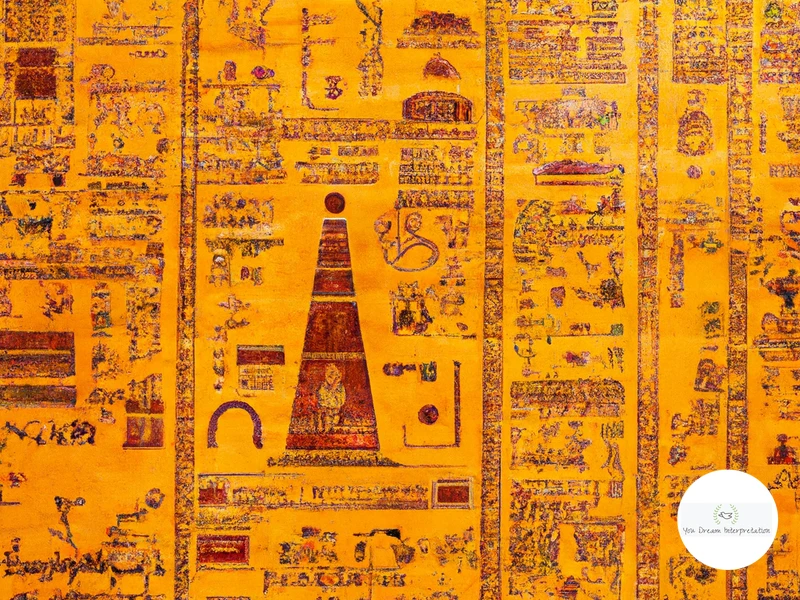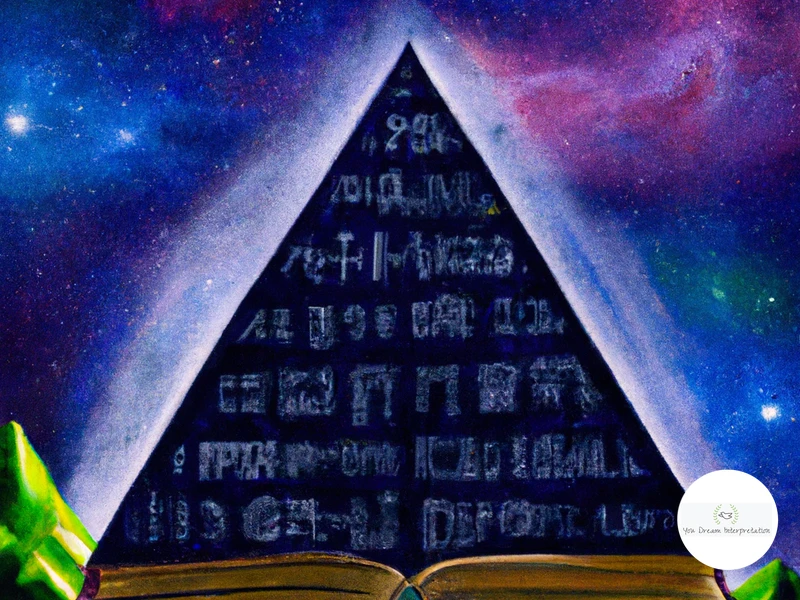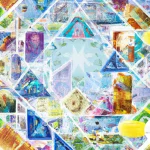Ancient civilizations have long held a fascination with the hidden meanings and symbolism behind numbers, leading to the development of numerology. This ancient practice, which assigns significance to numerical patterns and their impact on human life, played a pivotal role in several ancient cultures across the world. From the mystical beliefs of ancient Egypt to the philosophical principles of ancient China and the mythological significance in ancient Greece, numerology has left an indelible mark on the histories of these civilizations. In this article, we will explore the rich tapestry of numerological practices in these ancient cultures, shedding light on their profound understanding of numbers and their influence on various aspects of life. Let us embark on a journey through time and unravel the mysteries of numerology in ancient civilizations.
Numerology in Ancient Egypt

Ancient Egypt, known for its enigmatic symbolism and intricate belief systems, placed great importance on numbers in their cosmology. Numerology was deeply ingrained in the fabric of Egyptian society, with numbers holding profound meanings and connections to the divine. The ancient Egyptians believed that each number possessed its own unique power and represented specific aspects of existence. The number 3, for example, symbolized the trinity of the human experience – mind, body, and soul. Additionally, numbers were integral to Egyptian architecture and art, where they were carefully incorporated to represent cosmic balance and harmony. The use of numerology in ancient Egypt can be seen in the precise measurements and alignments of their monumental structures, such as the Great Pyramid of Giza, which was built with impeccable mathematical precision. These numerical elements not only reflected the Egyptians’ awe-inspiring understanding of mathematics but also their belief in the mystical properties of numbers. Through studying numerology in ancient Egypt, one can gain a profound insight into the sacred connection between numbers, the universe, and the human experience, pointing towards the mysteries that lie within the /life-path-number-challenges-lessons/.
The Importance of Numbers in Egyptian Cosmology
In Egyptian cosmology, numbers held immense significance and were believed to be integral to the fabric of the universe. Each number was associated with a specific deity or concept, and understanding the symbolism behind these numbers was essential to comprehending the mysteries of the cosmos. The ancient Egyptians believed that numbers were not merely abstract representations but conduits through which divine energies flowed. For example, the number 1 represented unity and the primordial source of all creation, while the number 7 represented completeness and perfection, as it coincided with the seven celestial bodies visible to the naked eye. The Egyptians also regarded certain numbers as sacred, such as the numbers 4 and 9, which were associated with the realms of life and death and held immense spiritual significance. The ancient Egyptians’ meticulous attention to numbers extended to their religious rituals, architectural designs, and even the placement of hieroglyphs in tombs and temples. Through their complex understanding of numerology, the Egyptians sought to establish harmony and balance between the earthly and divine realms. The study of numerology in Egyptian cosmology not only offers a glimpse into the ancient civilization’s spiritual beliefs but also invites us to explore our own /the-connection-between-life-path-numbers-and-finding-your-true-calling/ by recognizing the profound influence numbers have on our lives.
Numerological Significance in Egyptian Architecture and Art
The numerological significance in Egyptian architecture and art showcases the profound connection between numbers and the visual representation of their beliefs. The ancient Egyptians incorporated specific numerical patterns and proportions in their architectural structures and artistic creations, believing that these numerical elements could tap into the divine energy and bring forth harmonious vibrations. One striking example of this numerological significance can be observed in the famous Temple of Karnak in Luxor, Egypt. The temple’s layout and design embody precise mathematical ratios and geometric alignments, reflecting the Egyptians’ deep understanding of sacred numbers. The numbers 5 and 10, which held great significance in Egyptian numerology, played a pivotal role. The temple’s main axis, for instance, was divided into ten equal sections, representing the ten deities in the Egyptian pantheon. The construction of the temple involved the use of the golden ratio, a mathematical concept symbolizing divine proportion and aesthetic balance. The intricate carvings and hieroglyphs found within Egyptian art also demonstrate the application of numerology. Each symbol and figure carried specific numerical values and meanings, creating a complex tapestry of coded messages. These numerical representations were believed to unlock hidden knowledge and spiritual truths. The combination of numerology and artistic expression in ancient Egypt highlights the intertwining of mathematics, spirituality, and aesthetics in their culture. By exploring the numerological significance in Egyptian architecture and art, we gain valuable insights into their deep spiritual beliefs and their pursuit of harmony within the cosmic order. To learn more about the connection between numerology and compatibility, you can explore the concept of /karmic-numbers-compatibility/.
Numerology in Ancient China
Ancient China was deeply influenced by numerology, with numbers playing a pivotal role in various aspects of their culture and philosophy. The Chinese believed that numbers held significant cosmic energy and were closely tied to the principles of Yin and Yang. Numerology in ancient China was intertwined with their philosophy, particularly with the concepts of harmony, balance, and the interconnectedness of all things. The number 5, for instance, represented the five elements: wood, fire, earth, metal, and water, which were believed to be the fundamental building blocks of the universe. Numerology had a significant impact on Chinese astrology and Feng Shui, where the positioning and arrangement of objects and structures were determined by the energy associated with certain numbers. This can be seen in the layout of traditional Chinese cities, where streets and buildings were designed based on principles of numerology to promote harmonious living. Thus, numerology in ancient China permeated all aspects of life, guiding decisions and shaping beliefs with its profound understanding of the universal order and the interplay between numbers and the natural world.
The Influence of Numerology in Chinese Philosophy
The influence of numerology in Chinese philosophy cannot be overstated. Numbers hold a significant role in Chinese culture, with a deep-rooted belief that numbers have cosmic energy and vibrations. This belief is based on the concept of yin and yang, which represents the balance and interplay of opposing forces. In Chinese philosophy, numbers are seen as manifestations of the forces of nature and the universe. Each number is associated with certain qualities and characteristics that impact human life and destiny.
One of the most prominent examples of numerology in Chinese philosophy is the concept of Wu Xing, or the Five Elements. These elements – Wood, Fire, Earth, Metal, and Water – are deeply connected to the five cardinal directions, emotions, seasons, and even organs in the body. In this system, each element is assigned a numeric value, creating a complex web of numerical associations.
Chinese philosophy places great emphasis on the balance and harmony brought about by the interaction of opposing forces. This is exemplified in the philosophy of yin and yang, where even and odd numbers play a crucial role. Even numbers are associated with yang, representing light, strength, and masculinity, while odd numbers are associated with yin, representing darkness, softness, and femininity. The blend of these opposite forces is believed to create a harmonious existence.
Numerology in Chinese philosophy also extends to the I Ching, or the Book of Changes, which is a fundamental text in Chinese literature and philosophy. The I Ching uses a series of hexagrams, each consisting of six broken and unbroken lines, to reveal answers to questions and provide guidance. These hexagrams are believed to have profound numerical significance and represent different aspects of life and the universe.
The influence of numerology in Chinese philosophy is not limited to theoretical concepts but permeates various aspects of Chinese culture and daily life. It has influenced traditional Chinese medicine, Feng Shui practices, architecture, and even decision-making processes. The belief in the power of numbers and their ability to influence human destiny is deeply ingrained in Chinese culture.
Exploring the influence of numerology in Chinese philosophy provides valuable insights into the interconnectedness of numbers, the natural world, and the human experience. By understanding the underlying principles and symbolic meanings attributed to numbers in Chinese philosophy, one can gain a deeper appreciation for the rich tapestry of Chinese culture and its profound understanding of the cosmic significance of numbers.
Numerology in Chinese Astrology and Feng Shui
Chinese astrology and feng shui have a deep-rooted connection with numerology, with numbers playing a significant role in both practices. In Chinese astrology, each person’s birth date and time are analyzed to determine their Ba Zi or Four Pillars of Destiny. These pillars consist of four key components – the year, month, day, and hour of birth – each of which is associated with a specific Chinese zodiac animal sign and element. Numerology comes into play through the study of these components, as each number holds its own significance. For example, the number 8 is considered highly auspicious in Chinese culture due to its association with wealth and prosperity. Conversely, the number 4 is considered unlucky as it sounds similar to the Chinese word for death. These numerical influences are taken into account in personal astrological readings, guiding individuals in areas such as career choices, relationships, and overall life path. On the other hand, feng shui, the ancient practice of arranging and harmonizing one’s living spaces, also incorporates numerology in its principles. This is seen through the Bagua, a fundamental feng shui tool that divides a space into eight sections, each associated with a specific area of life such as wealth, relationships, or career. Each section is represented by a trigram, and the trigrams are in turn associated with numerical values. By understanding the numerological significance of these trigrams and their corresponding areas, one can effectively adjust and enhance the energy flow in their living or working environment. Whether it is selecting a lucky house number or arranging furniture in accordance with auspicious numerical patterns, numerology is a vital component of feng shui practice. In this way, numerology intricately weaves its way into both Chinese astrology and feng shui, offering guidance and insights into various aspects of life, while fostering harmony and balance in the cosmic energies that surround us.
Numerology in Ancient Greece

Numerology held great significance in ancient Greece, permeating various aspects of society and culture. Greek mythology, with its intricate pantheon of gods and goddesses, often incorporated numerological symbolism to convey deeper meanings. Numbers were believed to have divine origins and were seen as the building blocks of the universe. The Pythagoreans, a philosophical and mystical school of thought in ancient Greece, developed a complex system of numerology known as Pythagorean numerology. According to their teachings, each number held its own unique meaning, and the way numbers interacted with each other carried profound significance. This system not only shaped philosophical and metaphysical beliefs but also impacted Greek society, influencing everything from music and art to commerce and governance. The interconnectedness of numbers and their spiritual implications in ancient Greece shed light on the profound understanding of the universe and the human existence. Explore the fascinating realm of Greek numerology and the impact it had on society, and unlock the secrets it holds for modern interpretations of the self, destiny, and purpose.
The Role of Numbers in Greek Mythology
In Greek mythology, numbers had deep-rooted significance and played a pivotal role in shaping the narratives and symbolism of the ancient tales. Each number held its own distinct meaning and represented different aspects of the gods, goddesses, and mythical creatures. Let’s delve into some of the key examples of the role of numbers in Greek mythology:
1. The Number Three: The number three held immense importance in Greek mythology. It represented completeness and harmony. One prominent example is the three major gods in Greek mythology – Zeus, Poseidon, and Hades – who ruled over the sky, sea, and underworld respectively. The three Fates, known as the Moirai, were also significant figures, symbolizing the past, present, and future.
2. The Number Seven: Considered a sacred number, seven frequently appeared in Greek myths. For instance, there were seven Pleiades, nymphs who were daughters of the titan Atlas. The seven Pleiades were associated with fertility, agriculture, and celestial navigation. The seven seas and seven continents were mentioned in various myths, representing the vastness and completeness of the world.
3. The Number Twelve: Another influential number in Greek mythology was twelve. The twelve Olympian gods formed the most prominent divine council, with Zeus being the king of the gods. Additionally, the twelve labors of Heracles (Hercules) symbolized his journey of redemption and strength.
4. The Number Nine: The number nine was associated with the Muses, the goddesses of inspiration in Greek mythology. There were nine Muses, each representing a different art or science, such as music, history, and astronomy. These muses were believed to inspire creativity and knowledge.
These are just a few examples of how numbers held significant symbolic meaning in Greek mythology. Each number added depth and layers of meaning to the mythological narratives, showcasing the intricate relationship between numbers, storytelling, and the divine realm.
Pythagorean Numerology and its Impact on Greek Society
Pythagorean Numerology, named after the ancient Greek philosopher Pythagoras, had a profound impact on Greek society. Pythagoras believed that numbers were not just numerical entities but held deep spiritual and metaphysical significance. Pythagorean Numerology centered around the idea that numbers were the building blocks of the universe and held the key to understanding the world around us. In Greek society, this belief influenced various aspects of life.
1. Scientific Advancements: Pythagoras fostered a rigorous approach to mathematics and geometry, which laid the foundation for scientific advancements in Greek society. His teachings emphasized the importance of numerical relationships and ratios, leading to discoveries in fields like astronomy and music theory. The Pythagorean Theorem, which relates the sides of a right triangle, is perhaps the most well-known example of Pythagorean mathematics.
2. Spiritual and Mystical Beliefs: Pythagorean Numerology also had deep spiritual implications in Greek society. It was believed that numbers held hidden meanings and could be used to uncover the secrets of the universe. Different numbers were associated with specific qualities and characteristics, and individuals’ birth dates or names were believed to hold clues about their personalities and destinies.
3. Philosophical Influence: The philosophical implications of Pythagorean Numerology extended beyond mathematics. Pythagorean teachings emphasized the interconnectedness of all things, linking numerical patterns to the harmony and balance of the universe. This concept influenced Greek philosophy, particularly in the development of the concept of the “cosmic order” and the belief in a rational world governed by mathematical principles.
4. Symbolism in Art and Architecture: Pythagorean Numerology found expression in Greek art and architecture. The use of proportion and symmetry, based on numerical ratios, became central to Greek architectural designs. Temples, such as the Parthenon, were built with careful attention to mathematical principles and believed to reflect the divine harmony of the cosmos.
Pythagorean Numerology played a significant role in ancient Greek society. Its influence extended to scientific advancements, spiritual and mystical beliefs, philosophical concepts, and artistic expressions. By delving into the fascinating world of Pythagorean Numerology, the Greeks were able to explore the profound relationship between numbers and the fundamental nature of existence.
Conclusion
In conclusion, the use of numerology in ancient civilizations such as Egypt, China, and Greece serves as a testament to the universal fascination with numbers and their spiritual significance. These ancient cultures recognized the intricate relationship between numbers and various aspects of life, ranging from cosmology and architecture to philosophy and mythology. Numerology was not merely seen as a mathematical tool but as a doorway to deeper insights into the mysteries of the universe and the human existence.
In ancient Egypt, numbers held a cosmic power, guiding the construction of awe-inspiring structures and being integrated into art and symbolism. The Egyptians saw numbers as representations of divine forces and used them to achieve balance and harmony.
Similarly, in ancient China, numerology played a central role in philosophy, astrology, and Feng Shui. Chinese philosophers believed that numbers held the key to understanding the nature of reality and human existence. They saw numerical patterns as a reflection of the cosmic order and used them as a guide for harmonious living.
The ancient Greeks, influenced by philosophers like Pythagoras, delved into the mystical aspects of numbers. They believed in the inherent qualities and symbolism of numbers, as seen in their mythology and Pythagorean numerology. Numbers were believed to have an impact on everyday life and relationships, shaping the destiny of individuals and societies.
Overall, the study of numerology in these ancient civilizations reveals the depth of human curiosity and the desire to make sense of the world through the language of numbers. While their practices and interpretations may have differed, each culture recognized the significance of numbers in understanding the mysteries of existence. Numerology continues to captivate our imagination and influence various aspects of contemporary life, making it an enduring legacy of these ancient civilizations.
Frequently Asked Questions

What is numerology?
Numerology is a mystical belief system that assigns meaning and significance to numbers. It is based on the idea that numbers have inherent qualities and vibrations that can influence various aspects of life.
What role did numerology play in ancient civilizations?
Numerology played a significant role in ancient civilizations, where numbers were seen as powerful symbols with connections to the divine. They were used to understand the mysteries of the universe, guide decision-making processes, and represent cosmic balance and harmony.
How did ancient Egyptians use numerology?
Ancient Egyptians integrated numerology into their cosmology, seeing numbers as sacred and imbued with mystical properties. They believed that numbers had a profound influence on human life and the universe, using them for architectural measurements, religious rituals, and as a means of understanding the intricacies of existence.
What are the key numerological symbols in ancient Egyptian culture?
Ancient Egyptians attributed special significance to numbers such as 3, 4, and 7. The number 3 represented the trinity of mind, body, and soul, while 4 symbolized the four elements of earth, air, fire, and water. The number 7 was associated with perfection and divine completion.
Did numerology play a role in Chinese philosophy?
Yes, numerology had a profound influence on Chinese philosophy. It was believed that numbers held cosmic energy and influenced human destiny. Concepts such as the Yin and Yang balance and the Five Elements were deeply intertwined with numerological principles.
How does numerology connect with Chinese astrology?
Numerology plays a pivotal role in Chinese astrology. The Chinese zodiac, for example, assigns each year a specific animal sign and element based on a 12-year cycle. Numerological calculations are used to determine one’s zodiac sign and provide insights into character traits and compatibility with others.
What is Pythagorean numerology?
Pythagorean numerology originated in ancient Greece and is named after the philosopher Pythagoras. It is based on the belief that each number has a vibrational energy and a corresponding characteristic or quality. Pythagorean numerology assigns numerical values to letters, allowing for the interpretation of names and birth dates.
How did numerology impact Greek society?
Numerology held great significance in Greek society, permeating various aspects of life. It influenced the understanding of the cosmos, the interpretation of myths, and even the construction of buildings. Pythagorean numerology, in particular, played a significant role in Greek philosophical and mathematical traditions.
What is the significance of numbers in ancient Greek mythology?
In Greek mythology, numbers were intricately woven into the fabric of stories and legends. Specific numbers were associated with certain gods, heroes, and mythological events. For example, the number 12 was connected to the Twelve Olympian gods, signifying divine order and completion.
What can we learn from the numerological practices of ancient civilizations?
Studying the numerological practices of ancient civilizations allows us to gain insight into their deep spiritual and symbolic understanding of the world. It reveals the ways in which numbers were perceived as profound tools for interpreting and navigating the complexities of existence, providing a fascinating glimpse into the human quest for meaning and connection.
References
- Numerology: All You Need To Know About This Ancient …
- The Origins of Numerology – Cornerstone
- Numerology
Frequently Asked Questions

What is numerology?
Numerology is a mystical belief system that assigns special meanings and influences to numbers. It is the study of the relationship between numbers and various aspects of life, including personality traits, events, and even the universe itself.
How old is numerology?
Numerology has been practiced for thousands of years across different ancient civilizations. Its origins can be traced back to ancient Mesopotamia, Egypt, China, and Greece, where it played a significant role in their cultures and belief systems.
What role did numerology play in ancient Egypt?
Numerology held great importance in ancient Egyptian cosmology. The Egyptians believed that numbers had symbolic meanings and represented the fundamental principles of the universe. They used numerology to understand the cosmic order and divine forces shaping their lives.
How did numerology influence Egyptian architecture and art?
Numerology heavily influenced Egyptian architecture and artistic representations. They incorporated specific numerical proportions and sacred ratios in the design and construction of their temples, tombs, and pyramids. These numerical alignments were believed to create harmony and attract divine energies.
What role did numerology play in ancient Chinese philosophy?
Numerology had a profound influence on ancient Chinese philosophy. They believed that numbers carried spiritual significance and represented the balance and harmony of the universe. The Chinese used numerology to understand the interconnections between different aspects of life, such as health, relationships, and destiny.
How was numerology integrated into Chinese astrology and Feng Shui?
In Chinese astrology, numerology played a crucial role in determining a person’s character traits, compatibility with others, and predicting future events. In Feng Shui, the art of arranging one’s environment for optimal energy flow, numerology helped determine the auspicious placement of objects and colors based on their numerical symbolism.
How did numbers influence Greek mythology?
Numbers played a significant role in Greek mythology, where they were associated with gods, magical powers, and divine influences. Different numbers held specific meanings and were often used to represent concepts such as beauty, harmony, balance, and the order of the cosmos.
What was the impact of Pythagorean numerology on Greek society?
Pythagorean numerology, developed by the ancient Greek philosopher Pythagoras, had a profound impact on Greek society. It emphasized the belief that numbers were the building blocks of the universe and influenced every aspect of life. Pythagoreans used numerology for divination, unraveling hidden mysteries, and understanding the nature of reality.
Did other ancient civilizations also practice numerology?
Absolutely! Numerology was not limited to just ancient Egypt, China, and Greece. Many other ancient civilizations, such as the Babylonians, Mayans, and Indians, also practiced their unique forms of numerology. Each civilization developed its own interpretations and applications of numerological beliefs.
Is numerology still relevant today?
While some ancient numerological practices have evolved or been replaced over time, the belief in the mystical significance of numbers continues to be present in various cultures and belief systems around the world. Many people today still find personal meaning and guidance through numerology, whether in making life choices or exploring spiritual aspects of their lives.
References
- Number symbolism | History, Meaning, & Facts
- What is the history of numerology?
- Numerology as the base of the myth of creation, according to …








